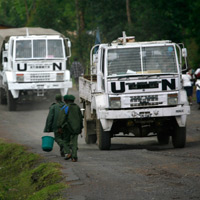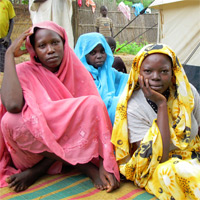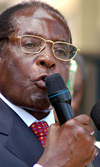Counterinsurgency Debate: A Tale of Two Countries
.jpg)
While we discuss the way forward in Afghanistan, a calamitous counterinsurgency operation is unfolding in the Democratic Republic of the Congo without the benefit of the same kind of thoughtful debate ...
An Uneasy Alliance in Eastern Congo

The human cost of Operation Kimia II—the ongoing joint offensive by the Congolese army and United Nations peacekeepers against Rwandan rebels in eastern Congo—outweighs its benefits. To prevent this crisis from deteriorating further, and to ensure that those military gains that have been achieved can be secured, the Congolese government should suspend new offensive operations and work vigorously with the U.N. peacekeeping mission in Congo, or MONUC, and international donors to put in place a more effective counterinsurgency approach ...
Javier Solana’s Foot in Mouth Problem
Speaking to reporters in Cairo yesterday, European Union foreign policy chief Javier Solana served up a wingtip sandwich. It is abundantly clear to most observers that southerners will vote for independence, and their decision must be respected by the international community. Solana’s statements are at best inappropriate. His suggestion that there a “preferable” outcome in the southern Sudanese vote is an affront to southerners and to the external actors—including many European countries—that painstakingly negotiated the agreement. As one colleague noted, “It’s clear to me that almost no one puts the southern Sudanese people into their calculations.” ...
Abyei: Sudan’s Next Test

This week’s legal decision on the boundary of Abyei—an oil-rich and contested region along the disputed North-South border within Sudan—is the first major test of recent commitments made in Washington by the two parties to Sudan’s 2005 Comprehensive Peace Agreement, or CPA. The international community—in particular the United States, which played a critical role in negotiating the Abyei Protocol—has a responsibility to ensure that the ruling is respected and that the residents of Abyei and the affected surrounding areas are protected from violence ...
Zimbabwe: Uncle Bob’s Tin Ear

If anyone is still looking for evidence of the disconnect between Zimbabwean President Robert Mugabe and reality, his recent remarks at a regional trade summit are pretty damning. After taking the reins of the Common Market for East and Southern Africa, or COMESA—a trade bloc representing 19 countries and nearly 400 million people—Mugabe offered some helpful guidance for portfolio managers in these uncertain economic times: Our message to investors worldwide and to those of our region is clear: we have a regional market for you, come to COMESA. Earth to Bob: Based on the economic performance in Zimbabwe over the ...
The Next Catastrophe in the Congo
Co-authored with Rebecca Feeley, Enough's researcher in eastern Congo While the world laments the plight of Pakistani and Sri Lankan civilians caught between government offensives and repugnant armed groups, a similar scenario is unfolding without much international notice in the Democratic Republic of the Congo. The Congolese army, with support from U.N. peacekeepers, is in the early stages of an offensive against Rwandan rebels ensconced in the lush forests of eastern Congo. The deplorable situation there--already one of the world's worst humanitarian crises--is poised to get much worse. While the Rwandan rebels are undoubtedly a scourge to the local population ...
On Stalwart International Justice Advocate Henry T. King
Last fall, my colleague Omer Ismail and I attended an extrordinary gathering at the Chautauqua Institution in upstate New York. Under the auspices of the Robert H. Jackson Center, the lead prosecutors at international courts for the former Yugoslavia, Rwanda, Sierra Leone, Cambodia, and the deputy prosecutor at the International Criminal Court in The Hague came together for the second annual international humanitarian law dialogs. (The Enough Project co-sponsored the event). Yet for all the firepower in that distinguished group, three former prosecutors stole the show. Henry T King, Jr., Whitney Harris, and Benjamin Ferencz were all prosecutors at Nuremburg, ...
Battle for Mogadishu: When Will It End?
My friend Michael Kleinman over at Change.org's Humanitarian Relief blog has a regular feature called The Worst Place in the World, and Sri Lanka has topped the list three weeks running. The news from Mogadishu this morning suggests that Somalia may top the list this week. Once again, armed groups battling for control of the city have opted for indiscriminate shelling of civilian neighborhoods as their preferred war tactic. This is from IRIN: At least 27,500 people fled their homes between 7 and 11 May, according to Ali Sheikh Yassin, deputy chairman of the Mogadishu-based Elman Human Rights Organisation (EHRO) ...
Eastern Congo: Cautious Optimism on Refugee Return

For the past 15 years, approximately 40,000 Congolese Tutsi refugees have been living in neighboring Rwanda. These refugees fled Congo in the aftermath of the 1994 Rwanda genocide, when more than a million Rwandan Hutus – including the orchestrators of the slaughter in Rwanda that later formed the FDLR – sought refuge in eastern Congo. While efforts to address the destabilizing presence of the FDLR in eastern Congo are the subject of intense analysis and debate, much less is written of the Congolese Tutsi refugees. Yet their fate is closely connected with the political turmoil in the North Kivu province ...
An “African response” to the ICC? Hardly
File this one under “why victims need the International Criminal Court.” Much has been written of the “African response” to the ICC’s arrest warrant for Sudanese President Bashir, but some reporters and commentators have mistakenly conflated the African Union’s response with the broader and more diverse cross-section of opinion on the continent, and frequently discount African voices who support the Court’s actions. Digging a bit deeper, it becomes clear that the AU’s reaction to the ICC’s move against Bashir seems less a response to the specific situation in Darfur and more an indication of the AU’s general feelings on accountability ...

